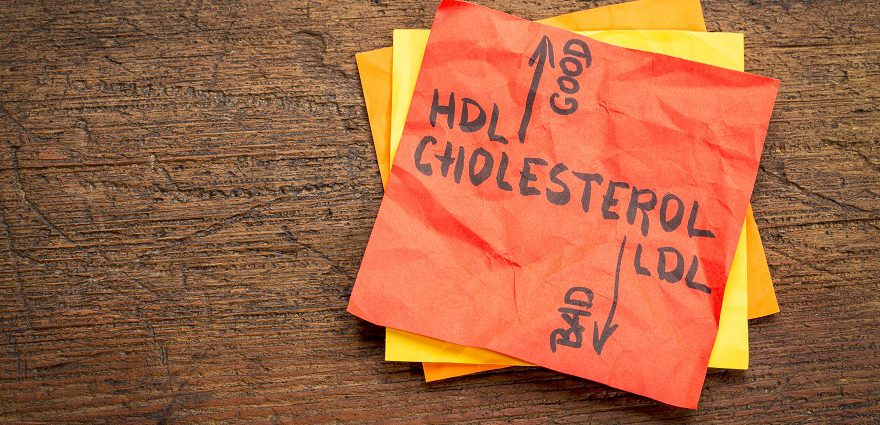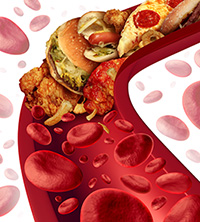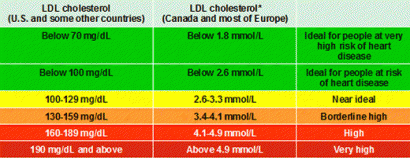The Lowdown on High Cholesterol and Your Health

Has your doctor just informed you that your cholesterol is too high? Here we discuss what this means for your health and what you should do about it.
 Cholesterol is a waxy substance that occurs naturally in most body tissues; not to mention the foods you eat. Your body — especially your liver — produces all the cholesterol it needs. When you eat a high-fat diet (think red meat, bacon, fried foods and full-fat dairy products) your liver produces excess cholesterol.
Cholesterol is a waxy substance that occurs naturally in most body tissues; not to mention the foods you eat. Your body — especially your liver — produces all the cholesterol it needs. When you eat a high-fat diet (think red meat, bacon, fried foods and full-fat dairy products) your liver produces excess cholesterol.
Unfortunately, the excess fat forms plaques that can cause blood clots. If a clot breaks off and blocks an artery that feeds the brain, it causes a stroke. If it blocks an artery in the heart, it causes a heart attack.
Cholesterol Types: The Good, the Bad and the Triglycerides

Source: Mayo Clinc
There are several types of cholesterol that affect your health in different ways:
Low-density Lipoprotein (LDL or “Bad”) Cholesterol
LDL partners with fats and other substances to build up in the inner walls of your heart arteries, clogging them and setting the stage for a heart attack or stroke.

Source: Mayo Clinc
High-density Lipoprotein (HDL or “Good”) Cholesterol
HDL is protective because it transports LDL away from the arteries, preventing build-ups.

Source: Mayo Clinc
Triglycerides
Triglycerides are another type of dangerous blood fat that increases the risk for heart disease if elevated.

Source: Mayo Clinc
Knowing Your Numbers
The American Heart Association recommends all adults aged 20 or older have their cholesterol checked every four to six years.
- Your total cholesterol (LDL plus HDL) should fall below 200 mg/dL
- Your LDL should be Below 70 mg/dL
- Your HDL should be 60 mg/dL and above.
- Triglycerides should fall below 150 mg/dL.
*mg/dL refers to milligrams per deciliter of blood. See our chart for more detailed information on your numbers.
*Canadian and European guidelines differ slightly from U.S. guidelines. These conversions are based on U.S. guidelines.
Factors You Can Control
There are many factors that affect your cholesterol levels — some of which you can control, others of which you can’t.
Your Diet
As the adage goes, you are what you eat. If your diet is rich in saturated fat and cholesterol, your blood cholesterol levels will rise.
Your Weight
Being overweight tends to increase your cholesterol. It also increases your risk for heart disease.
Your Physical Activity
Regular physical activity can help lower LDL cholesterol and raise HDL cholesterol levels. If you have high cholesterol, the American Heart Association recommends 40 minutes of moderate-to-vigorous aerobic exercise three to four times a week. (Always discuss any changes to your exercise regimen with your doctor first.)
Uncontrollable Factors
Your Age
Cholesterol levels rise with age. Even moderately high cholesterol levels in otherwise healthy adults aged 35 to 55 can have long-term effects on heart health, with every decade of high cholesterol increasing the risk of heart disease by 39 percent, report researchers at the Duke Clinical Research Institute in Durham, NC.
Your Gender
Prior to menopause, women have lower total cholesterol levels than men of the same age; however, after menopause, women’s LDL levels rise. One in four women dies from heart disease in the United States, according to the National Heart, Lung, and Blood Institute. This risk increases as women continue to age.
Your Genes
High blood cholesterol tends to run in families.
What to Do about Cholesterol
There is a lot you can do to lower your blood cholesterol levels and help to keep your heart healthy. For some, this may be eating a healthy low-fat, high-fiber diet and exercising regularly. For others, treatment may involve cholesterol-lowering medication in conjunction with lifestyle changes. Talk to your doctor today to find out where you stand.
Related Resources:
For more information on cholesterol and your health, visit:
The American Heart Association
The National Heart, Lung, and Blood Institute


